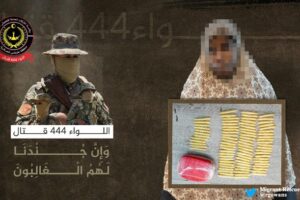Saudi Crown Prince Mohammed bin Salman approved the 2018 killing of U.S.-based journalist and Saudi critic Jamal Khashoggi at the Saudi Consulate in Istanbul, according to a declassified report released by the Biden administration on Friday.
The report, released by the Office of the Director of National Intelligence (ODNI), said the crown prince, the kingdom’s de facto leader, “approved an operation … to capture or kill” Khashoggi.
“We base this assessment on the Crown Prince’s control of decisionmaking in the Kingdom, the direct involvement of a key adviser and members of Muhammad bin Salman’s protective detail in the operation, and the Crown Prince’s support for using violent measures to silence dissidents abroad, including Khashoggi,” the report said.
“Since 2017, the Crown Prince has had absolute control of the Kingdom’s security and intelligence organizations, making it highly unlikely that Saudi officials would have carried out an operation of this nature without the Crown Prince’s authorization,” it continued.
The four-page report’s release was highly anticipated and is part of President Biden’s strategy to “recalibrate” the relationship with Saudi Arabia, where he has committed to emphasize democratic values and human rights in Washington’s dealings with Riyadh.
“For too long, the United States failed to hold Saudi Arabia accountable for the brutal murder of journalist, dissident, and Virginia resident Jamal Khashoggi,” Senate Intelligence Committee Chairman Mark Warner (D-Va.) said in statement Friday. “I’m encouraged to see the new administration taking steps to rectify that by releasing this long-overdue congressionally mandated report into his killing.”
The report was released the day after Biden spoke with Saudi Arabia’s King Salman. A White House statement on the call did not mention Khashoggi or the report, but said the president “affirmed the importance the United States places on universal human rights and the rule of law.”
On Wednesday, Biden said he had read the report, without elaborating.
Asked Friday whether Biden raised Khashoggi with the king, White House press secretary Jen Psaki declined to elaborate on the call, but stressed to reporters that officials “at every level” have publicly raised concerns about human rights abuses.
Khashoggi was killed by a Saudi hit squad, including a bone saw-wielding forensic doctor, in October 2018 while he was at the Saudi Consulate in Istanbul to obtain documents for a marriage license. Turkish authorities have said he was strangled soon after entering the consulate and dismembered.
The report’s release Friday was paired with an announcement by Secretary of State Antony Blinken of visa restrictions against 76 Saudi individuals believed to be engaged in threatening dissidents overseas, including but not limited to those connected to Khashoggi’s murder.
“While the United States remains invested in its relationship with Saudi Arabia, President Biden has made clear that partnership must reflect U.S. values,” Blinken said in a statement. “To that end, we have made absolutely clear that extraterritorial threats and assaults by Saudi Arabia against activists, dissidents, and journalists must end. They will not be tolerated by the United States.”
Called the “Khashoggi ban,” the visa restrictions can be imposed on any individual believed to be directed by a foreign government to seriously harass and threaten people perceived as dissidents.
The Treasury Department also announced sanctions on Ahmad Hassan Mohammed al Asiri, Saudi Arabia’s former deputy head of the General Intelligence Presidency, who the department said was “assigned to murder” Khashoggi and was the “ringleader” of the operation.
Treasury also slapped sanctions on Saudi Arabia’s Rapid Intervention Force, Crown Prince Mohammed’s elite personal protective detail whose members were part of the hit squad. But the sanctions notably did not target the crown prince himself.
The report on Friday listed the names of 21 individuals U.S. intelligence officials have “high confidence … participated in, ordered, or were otherwise complicit in or responsible for” Khashoggi’s murder “on behalf of” Crown Prince Mohammed. Still, it says the United States can’t confirm if the individuals knew the operation would result in the journalist’s death.
The report highlighted that members of the hit team included officials linked to the Saudi Center for Studies and Media Affairs, whose leader publicly said in 2018 he did not make decisions without the crown prince’s approval.
The team also included seven members of Crown Prince Mohammed’s elite personal protective detail, who the U.S. officials “judge would not have participated in the operation against Khashoggi without Muhammad bin Salman’s approval,” the report said.
Rep. Gerry Connolly (D), a senior member of the House Foreign Affairs Committee who represents the Virginia district where Khashoggi resided, called for a “reevaluation” of the U.S. and Saudi relationship in the wake of the crown prince’s responsibility.
“This report lays the blame for the brutal murder of Jamal Khashoggi, my constituent, directly at the feet of the Crown Prince. Saudi Arabia must be held accountable, and that demands a careful and complete re-evaluation of the US relationship with the Kingdom,” Connolly said in a statement. “It is a dark stain on the Trump administration that they were willing to keep this report from the American people in order to protect its relationships with the Crown Prince over and above basic American values and Jamal’s life itself.”
Sarah Leah Whitson, executive director of Democracy for the Arab World Now (DAWN), a U.S. organization founded by Khashoggi shortly before his murder, said the report’s release helps confirm previously reported details.
“At minimum, certainly this information is really just further confirmation of what we all know — and that is that Mohammed bin Salman is responsible for the murder of Jamal, our founder,” she said.
Whitson said DAWN is likely to include the ODNI report in its own civil suit against the crown prince, which was filed with Khashoggi’s fiancee Hatice Cengiz in the U.S. District Court of the District of Columbia and seeks monetary damages.
Whitson added the report’s release serves as a warning against such brazen violent actions.
“It is an important warning and we hope an important measure of deterrence against other despots who think they can go around the world killing people they don’t like in foreign countries,” she said.
Biden has already taken actions shifting the U.S. relationship with Saudi Arabia, in part over Khashoggi’s murder and supported by Congress. They include ending U.S. support for the Saudi-led offensive in Yemen, as well as relevant weapons sales to the kingdom.
Rep. Adam Schiff (D-Calif.), chairman of the House Intelligence Committee, urged the Biden administration to follow the report’s release with “serious repercussions against all of the responsible parties it has identified, and also reassess our relationship with Saudi Arabia.”
“We must ensure that if foreign governments target journalists simply for doing their jobs, they are not immune to serious repercussions and sanctions, because restoring confidence in American leadership requires we act in accordance with the values that have long set America apart,” Schiff said. “The administration should take further steps to diminish the United States’s reliance on Riyadh and reinforce that our partnership with the Kingdom is not a blank check.”
The State Department on Friday is reportedly expected to announce further restrictions on offensive weapons to the kingdom.
Still, Pentagon press secretary John Kirby stressed after the report’s release that Saudi Arabia “remains a strategic partner in the region.” He declined to comment on the ODNI report itself, describing it as outside the purview of the Defense Department.











Add Comment